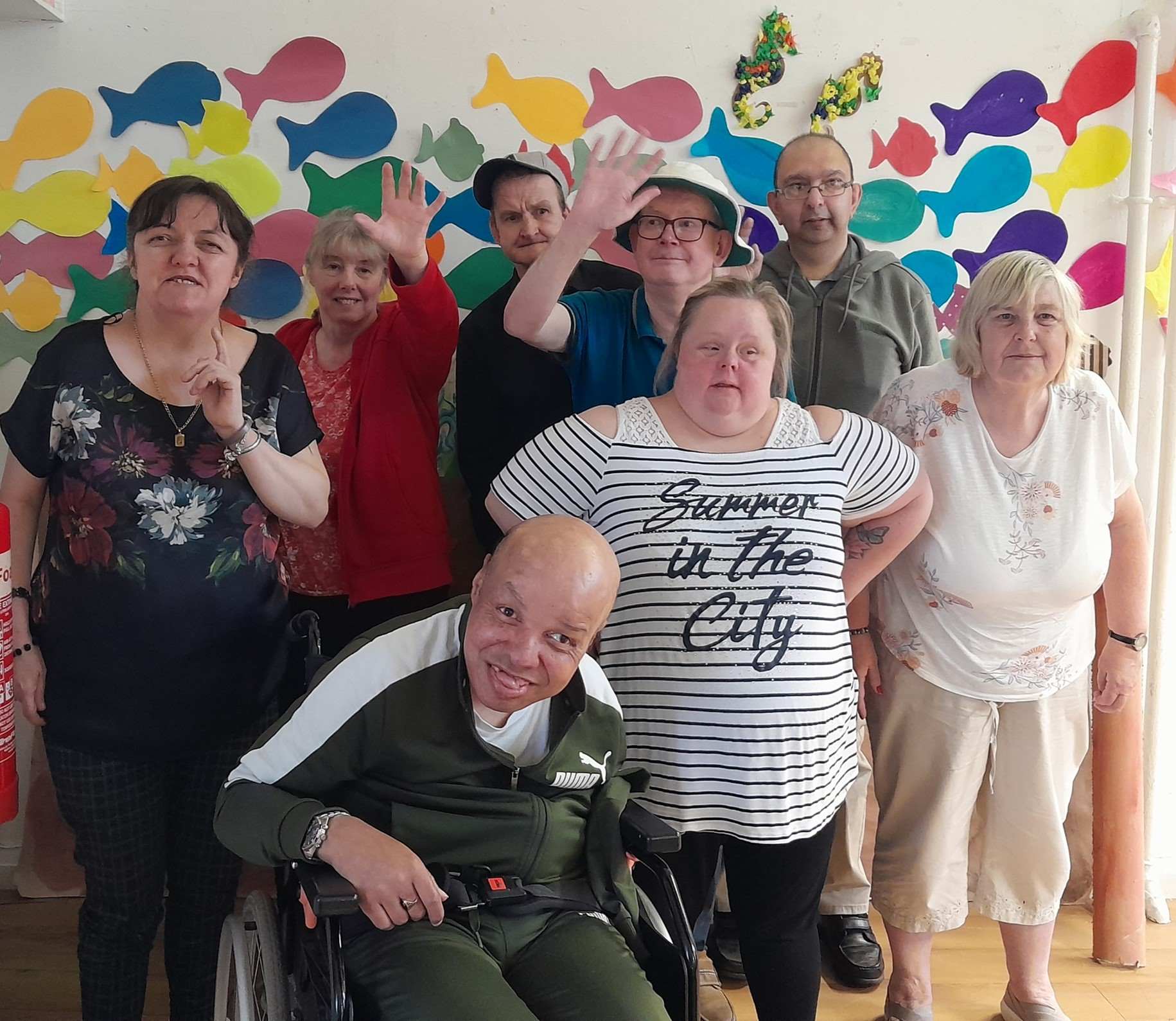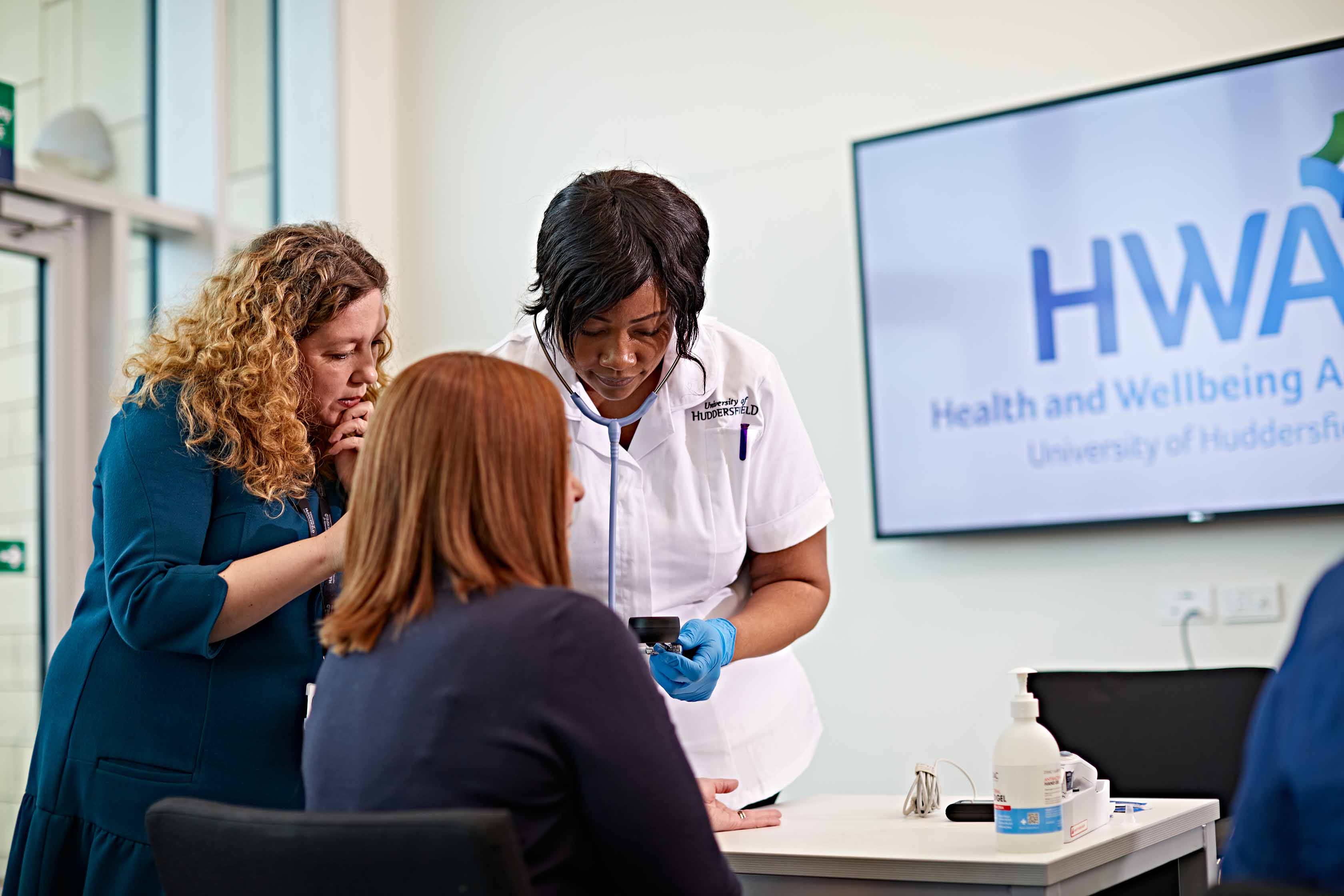
Health and Social Care BSc(Hons)
Start Dates
21 September 2026
Duration
3 years full-time
UCAS Tariff
104
Overview
Why choose Huddersfield for this course?
- Gain confidence using our state-of-the-art skills labs and immersive simulation facilities on our National Health Innovation Campus.
- You’ll learn from experienced health professionals and service users whose real-world insights bring teaching to life.
- Build communication, leadership and teamwork skills through our Health and Wellbeing Academy’s community-focused work experience opportunities.
From exploring different aspects of Health and Social Care to looking at how to assess needs, our Health and Social Care BSc(Hons) degree will also introduce you to law, social policy, assessment and care planning. On the course, you’ll explore your own values in relation to working with diverse groups, and you’ll engage in becoming a reflective practitioner.
Why study Health and Social Care BSc(Hons)
In Yorkshire and the Humber, for Social Work we’ve ranked top 5 in the Guardian League Tables 2026 and 2nd for in the Complete University Guide 2026. Also, in the National Student Survey 2025, Health Studies at Huddersfield is ranked top in Yorkshire for learning opportunities, and the top 5 in the UK for academic support, organisation and management and learning resources.
Introducing you to a wealth of post-university career opportunities, this course gives you the chance to put your theoretical skills into practice by undertaking a work placement in your third year. You may also have the opportunity to work and study abroad via the Turing Scheme. Supporting and enhancing your learning and increasing your future employability prospects, the placement could give you the chance to make useful industry contacts, as well as give you the edge when applying for a relevant role. You’ll have the opportunity to progress to careers in diverse areas, including youth work, housing, domestic violence, social prescribing, and drug and alcohol support. Alternatively, you could pursue further, Master’s level study to enter fields such as nursing, social work, and occupational therapy.
On campus, you’ll be taught by a supportive and experienced teaching team, who have worked in a range of health and social care roles. Bringing their teaching to life with real-life case studies, they will be on hand to guide you throughout the course, with everything from on-campus work to placements. You’ll be taught a wide variety of aspects of health and social care, from health and community development to social policy, residential health, and more. You’ll have the best chance of success on this course, as you’ll learn from the best. Our staff rank in the top three in England for the proportion who hold doctorates, who have higher degrees, and hold teaching qualifications (HESA 2022).
Also, our Public Partnership Group (PPG) and Health and Wellbeing Academy work together to support your development as a compassionate, person-centred professional. You’ll engage with service users and carers through lectures, discussions, and simulations. Their lived experiences will help to build your communication skills, empathy, and the critical thinking needed to deliver outstanding care across diverse communities. While our Health and Wellbeing Academy offers hands-on placement opportunities through initiatives like Get Set Goal and Restart a Heart. These experiences will help you build skills in communication, public health, leadership, and teamwork while making a real impact in the community.
Not quite ready to start Health and Social Care BSc(Hons)? Successful completion of our Health Foundation Pathway leading to a BSc(Hons) Degree will equip you with the foundation knowledge to study Health and Social Care.
Entry Requirements
BCC at A Level.
MMM in BTEC Level 3 Extended Diploma.
104 UCAS tariff points from a combination of Level 3 qualifications.
Access to Higher Education Diploma with 45 Level 3 credits at Merit or above.
Pass at T Level with grade C on core
104 UCAS tariff points from International Baccalaureate qualifications.
If you do not have the appropriate qualifications for direct entry to this degree you may be able to apply to our Health Foundation Pathway leading to a BSc(Hons) Degree.
If your first language is not English, you will need to meet the minimum requirements of an English Language qualification. The minimum for IELTS is 6.0 overall with no element lower than 5.5, or equivalent. Read more about the University’s entry requirements for students outside of the UK on our International Entry Requirements page.
We are keen to support a wide and diverse range of applicants on to our courses. Other suitable experience or qualifications will be considered. For further information please see the University's minimum entry requirements.
Course Details
For more information on when and how we update our modules please see the ‘Legal Information’ section below.
Teaching and Assessment
Discover what to expect from your tutor contact time, assessment methods, and feedback process.
Global Professional Award
At Huddersfield, you’ll study the award-winning Global Professional Award (GPA) alongside your degree* — so you’re ready for the career you want, whatever subject you choose.
Placements
This course includes a compulsory 160 hour work placement in your third year in an appropriate environment, providing you the opportunity to relate theory to practice and develop skills in a real world context. In order to undertake your placement you'll need to have a satisfactory Disclosure and Barring Service (DBS) check.
You'll have the opportunity to choose from a wide range of existing and new placement providers for example, housing organisations, Women’s Aid, drug and alcohol services, community gardening projects and health promotion services. A successful placement experience may lead to further opportunities with the placement provider, such as volunteering or paid work.
Also, our Health and Wellbeing Academy at the University of Huddersfield provides dynamic, interprofessional placement opportunities, enabling you to gain real-world experience in schools, community settings, and across various sectors. Through initiatives such as Get Set Goal and Restart a Heart, you’ll have the opportunity to apply your learning in practical ways, delivering health checks, wellbeing support, and CPR training to diverse audiences. Supported by experienced academic staff, these placements help you develop a wide range of skills including communication, public health education, leadership, teamwork, data capture, and audit, preparing you for future professional practice.
My placement enabled me to go into police custody suites and offer support to the detainees, I also shadowed several home visits and assessments of vulnerable adults and children. This was beneficial to my career, widening my experience and solidifying my dream of becoming a social worker.
- Jade Nothers
Graduated from Health and Social Care BSc(Hons), now a Custody Worker at West Yorkshire Liaison and Diversion
Your Career
We know from previous experience that students will go onto a variety of careers, such as working in drug and alcohol services, housing agencies, domestic violence services, disability and wellbeing services, teaching, and relevant Master's courses to pursue vocations such as Social Work and Nursing.
65%
Graduates from this course were in work or further study 15 months after graduation.
* HESA Graduate Outcomes 21/22, UK Domiciled
I completed two placements, at a Women's Centre and a social enterprise organisation where I developed my counselling skills and personal attributes. Being able to create and implement a project I had worked on and to see it running give me confidence in my ideas and knowledge. My lecturers and tutors went above and beyond to help, from guidance to having one-to-one support on coursework.
- Nazia Rahman-Choudhry
Graduated Health and Social Care BSc(Hons), now working at Huddersfield Royal Infirmary.
Fees and Finance
This information is for Home students applying to study at the University of Huddersfield in the academic year 2026/27.
Please note that tuition fees for subsequent years may rise in line with inflation (RPI-X) and/or Government policy.
From January 2027 the UK government is launching a new student funding system for people starting university education. Read more about the Lifelong Learning Entitlement (LLE).
For detailed information please visit https://www.hud.ac.uk/study/fees/
This information is for international students applying to study at the University of Huddersfield in the academic year 2026/27.
Please note that tuition fees for subsequent years may rise in line with inflation (RPI-X) and/or Government policy.
For detailed information please visit https://www.hud.ac.uk/international/fees-and-funding/
Placement
There may be additional travel costs to attend placement.
Scholarships and Bursaries
Discover what additional help you may be eligible for to support your University studies.
Tuition Fee Loans
Find out more about tuition fee loans available to eligible undergraduate students.
What’s included in your fee?
We want you to understand exactly what your fees will cover and what additional costs you may need to budget for when you decide to become a student with us.
If you have any questions about Fees and Finance, please email the Student Finance Team.
Explore More
Why Hud
Explore the unique opportunities and resources that make our institution a top choice for students seeking a well-rounded and future-focused education.
More Info
Careers support
We know you’re coming to university to study on your chosen subject, meet new people and broaden your horizons. However, we also help you to focus on life after you have graduated to ensure that your hard work pays off and you achieve your ambition.
Find out more about careers supportStudent support
At the University of Huddersfield, you’ll find support networks and services to help you get ahead in your studies and social life. Whether you study at undergraduate or postgraduate level, you’ll soon discover that you’re never far away from our dedicated staff and resources to help you to navigate through your personal student journey.
See our support servicesTeaching Excellence
Great teaching is engaging and inspiring — it helps you reach your full potential and prepares you for the future. We don’t just teach well — we excel — and we have the awards and recognition to prove it.
Find out moreInspiring Academics
Our researchers carry out world-leading work that makes a real difference to people’s lives. Staff within the Department of Allied Health Professions, Sport and Exercise may teach you on this course.
Find out more about our staffResearch Excellence
You’ll be taught by staff who want to support your learning and share the latest knowledge and research.
Find out moreAccommodation
Looking for student accommodation? Huddersfield has you covered. HudLets has a variety of accommodation types to choose from, no matter what your preference. HudLets is the University’s approved accommodation service, run by Huddersfield Students’ Union.
Take a look at your optionsFurther Study
If you want to continue your learning beyond your undergraduate degree, there is a range of financial support available for postgraduate study, including discounts for Huddersfield graduates.
Discover postgraduate coursesLegal information
When you enrol as a student of the University, your study and time with us will be governed by our terms and conditions, Handbook of Regulations and associated policies. It is important that you familiarise yourself with these as you will be asked to agree to them when you join us as a student. You will find a guide to the key terms here, along with the Student Protection Plan.
Although we always try and ensure we deliver our courses as described, sometimes we may have to make changes for the following reasons:
Changes to a course you have applied for but are not yet enrolled on
If we propose to make a major change to a course that you are holding an offer for, then we will tell you as soon as possible so that you can decide whether to withdraw your application prior to enrolment. We may occasionally have to withdraw a course you have applied for or combine your programme with another programme if we consider this reasonably necessary to ensure a good student experience, for example if there are not enough applicants. Where this is the case we will notify you as soon as reasonably possible and if you are unhappy with the change we will discuss with you other suitable courses we can transfer your application to. If you do not wish to transfer to another course with us, you may cancel your application and we will refund you any deposits or fees you have paid to us.
Changes to your course after you enrol as a student
Changes to option modules
Where your course allows you to choose modules from a range of options, we will review these each year and change them to reflect the expertise of our staff, current trends in research and as a result of student feedback or demand for certain modules. We will always ensure that you have an equivalent range of options to that advertised for the course. We will let you know in good time the options available for you to choose for the following year.
Major changes
We will only make major changes to non-optional modules on a course if it is necessary for us to do so and provided such changes are reasonable. A major change is a change that substantially changes the outcomes, or a significant part of your course, such as the nature of the award or a substantial change to module content, teaching days (part time provision), type of delivery or assessment of the core curriculum. For example, it may be necessary to make a major change to reflect changes in the law or the requirements of the University’s regulators or a commissioning or accrediting body. We may also make changes to improve the course in response to student, examiners’ or other course evaluators’ feedback or to ensure you are being taught current best practice. Major changes may also be necessary because of circumstances outside our reasonable control, such as a key member of staff being unable to teach due to illness, where they have a particular specialism that can’t be adequately covered by other members of staff; or due to pandemics, other disasters (such as fire, flood or war) or changes made by the government.
Major changes would usually be made with effect from the next academic year, but may happen sooner in an emergency. We will notify you as soon as possible should we need to make a major change and will consult with affected groups of students and any changes would only be made in accordance with our regulations. If you reasonably believe that the proposed change will cause you detriment or hardship we will, if appropriate, work with you to try to reduce the adverse effect on you or find an appropriate solution. Where an appropriate solution cannot be found and you let us know before the change takes effect you can cancel your registration and withdraw from the University without liability to the University for any additional tuition fees. We will provide reasonable support to assist you with transferring to another university if you wish to do so and you may be eligible for an exit award depending on how far through your course you are.
In exceptional circumstances, we may, for reasons outside of our control, be forced to discontinue or suspend your course. Where this is the case, a formal exit strategy will be followed in accordance with the student protection plan.
The Office for Students (OfS) is the principal regulator for the University.








